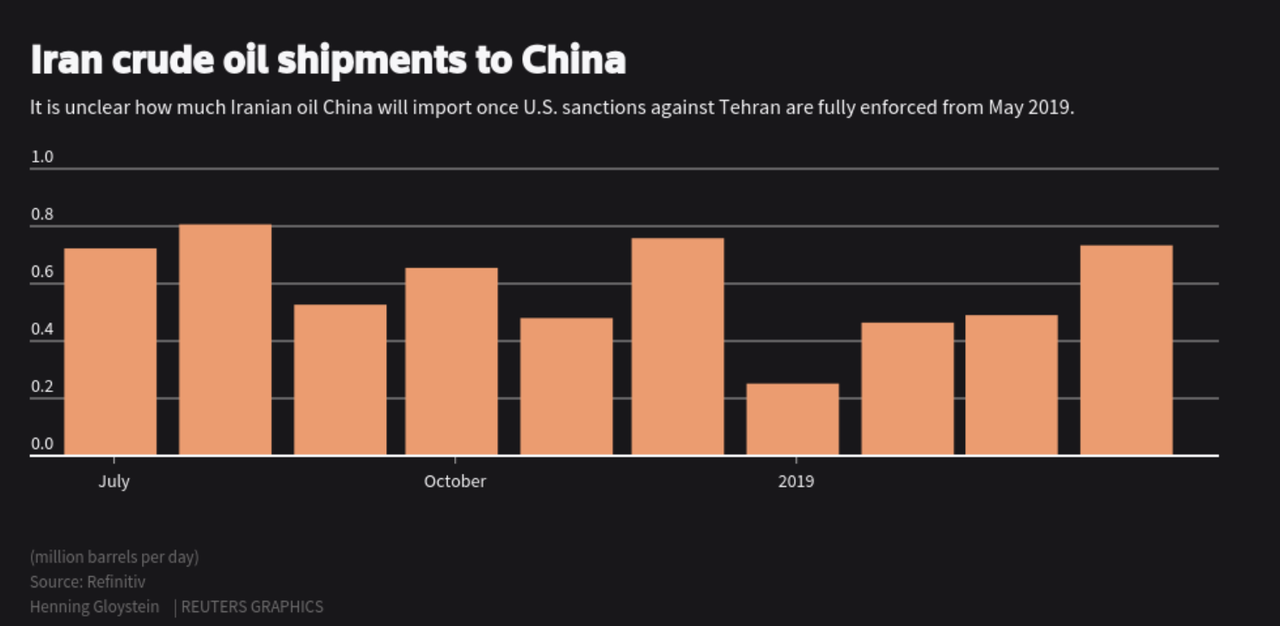It’s no secret that Beijing has chafed at American audacity to try and dictate whom Chinese refineries can and can’t buy oil from. And in the latest example of just how aggravating the decision to end waivers for Iranian crude imports has been for the world’s second-largest economy, Reuters reported that some 20 million barrels of Iranian crude have been languishing at the northeastern port of Dalian for months, but because of the US’s decision to re-impose sanctions on Iran back in November, nobody wants to touch the oil.
Even when the waivers were in effect, Chinese refineries couldn’t secure financing and insurance that would allow them to purchase the oil because of the uncertainty surrounding the future of the waivers.
Iran sent the oil to China via the National Iranian Tanker Company before the sanctions were imposed as Iran struggled with a backlog of oil that had exhausted the country’s domestic storage capacity. So Beijing, the largest buyer of Iranian oil, allowed the NTCC to store some oil in so-called bonded storage tanks situated in the Dalian port. The oil has yet to go through Chinese customs.
China filed a formal complaint with the US over its decision to end the waivers, but the US has refused to consider any exceptions to its plans to reimpose full sanctions.
As one analyst told Reuters, no Chinese company will touch the oil unless specifically instructed to do so by the Chinese government.
The oil is being held in so-called bonded storage tanks at the port, which means it has yet to clear Chinese customs. Despite a six-month waiver to the start of May that allowed China to continue some Iranian imports, shipping data shows little of this oil has been moved.
Traders and refinery sources pointed to uncertainty over the terms of the waiver and said independent refiners had been unable to secure payment or insurance channels, while state refiners struggled to find vessels.
The future of the crude, worth well over $1 billion at current prices, has become even more unclear after Washington last week increased its pressure on Iran, saying it would end all sanction exemptions at the start of May.
“No responsible Chinese company with any international exposure will have anything to do with Iran oil unless they are specifically told by the Chinese government to do so,” said Tilak Doshi of oil and gas consultancy Muse, Stancil & Co in Singapore.
To be sure, Reuters says, some of the oil was apparently purchased by a Sinopec refinery. But the bulk of the stock remains untouched.
Some Iranian oil sent to Dalian has moved, according to a ship tracking analyst at Refinitiv.
Dan, a supertanker owned by NITC moved 2 million barrels of oil from Dalian more than 1,000 km (620 miles) to the south to the Ningbo Shi Hua crude oil terminal in March, according to Refinitiv data.
Ningbo is home to Sinopec’s Zhenhai refinery, one of the country’s largest oil plants with a capacity of 500,000 barrels a day and a top processor of Iranian oil.
The headache for Beijing will likely only get worse, because shipping data show more Iranian crude is heading for Chinese ports.
For now, more Iranian oil is heading to China, with the supertankers Stream and Dream II due to arrive in eastern China from Iran on May 5 and May 7, respectively, Refinitiv data showed.
Some of this crude may be from Chinese investments into Iranian oilfields, a sanctions grey area.
Eventually, this could create incentives for non-compliance that are just too powerful for Chinese companies to ignore, particularly companies that have investments in Iranian oilfields. Some companies might try bartering for the oil, while others resort to illegally forged documents.
Whether China will keep buying oil from Iran remains unclear, but analysts at Fitch Solutions said in a note “there may be scope for imports via barter or non-compliance from … China.”
Muse, Stancil & Co’s Doshi said the only way to get the Iranian oil out of Dalian now was by cheating.
“Only rogue parties might try to cheat the system and try to pass the Iranian oil at Dalian as something else via fraudulent docs. But I doubt this is easy or can amount to much in terms of volume.”
Regardless of what happens to the oil, the incident serves as a reminder of the many annoyances that US sanctions create for its geopolitical rivals. Every barrel of China has sitting offshore that its refineries can’t touch is one more reason for Beijing to pursue the creation of an alternative payments channel that’s outside of American control…and more incentive for Chinese refineries, at the government’s behest, to push exporters to accept payment in yuan, something that the Shanghai-traded, yuan-denominated oil futures have already incentivized.
The US should acknowledge the perverse incentives for de-dollarization that its own policies have created – something that one of America’s favorite boogeyman has labeled a “colossal strategic mistake.”
via ZeroHedge News http://bit.ly/2GUMNp5 Tyler Durden

